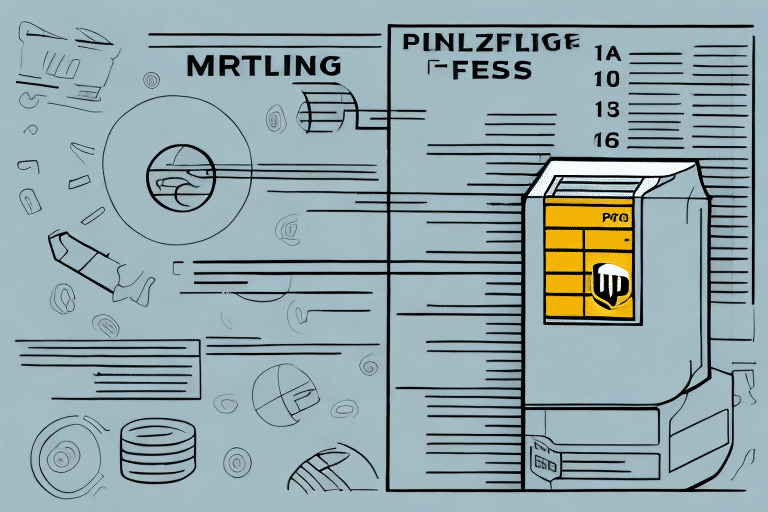Understanding UPS Additional Handling Fees
For businesses that frequently ship large packages, understanding UPS additional handling fees is crucial. These fees are surcharges applied when a package exceeds UPS’s standard size or weight limits or requires special handling due to its shape or contents. These fees are in addition to regular shipping charges and are designed to cover the extra labor and resources needed to process such shipments.
How Are Additional Handling Fees Calculated?
UPS calculates additional handling fees based on a formula that considers the package's weight, dimensions, and any special handling requirements. Typically, a standard fee is applied to packages that exceed certain thresholds. For example, packages weighing over 70 pounds or those with a combined length and girth exceeding 130 inches may incur additional fees. The exact fee varies depending on the specific characteristics of the package.
Factors Contributing to Additional Handling Fees
- Weight and Size: Heavier and larger packages require more resources to handle.
- Package Contents: Items that are fragile, hazardous, or perishable may need special handling.
- Shape: Odd-shaped packages that are difficult to stack or store can result in higher fees.
- Delivery Location: Shipping to remote or hard-to-reach areas may incur additional transportation costs.
Determining If Your Package is Subject to Additional Fees
To determine if your package will incur UPS additional handling fees, you need to assess its weight, dimensions, and contents:
- Weight: Packages over 70 pounds are typically subject to additional fees.
- Dimensions: Calculate the girth by adding the length and twice the width and height. If the total exceeds 130 inches, additional fees apply.
- Contents and Shape: Items that are fragile, hazardous, or unusually shaped may require special handling.
For the most accurate assessment, consult the UPS Packaging Guidelines or use their online shipping calculator.
Strategies to Avoid Additional Handling Fees
Proper Packaging
Using sturdy, appropriately sized boxes can help avoid additional fees. Ensure that packages are tightly packed to prevent shifting and damage during transit.
Utilize UPS Services
UPS offers various services like package consolidation and freight shipping, which can be more cost-effective for larger or heavier items. By leveraging these services, businesses can manage shipping costs more efficiently.
Negotiate Shipping Rates
High-volume shippers may negotiate lower shipping rates with UPS. Discuss your shipping needs with a UPS representative to explore potential discounts or fee waivers.
Consider Alternative Carriers
Comparing rates and fees across different carriers like FedEx or USPS can help you find the most economical option for your shipping needs.
Dealing with Additional Handling Fees
Incurred Fees
If your package incurs additional handling fees, you will receive a separate invoice detailing these charges. The fees are based on the package’s weight, dimensions, and any special handling requirements.
Appealing Fees
If you believe the fees were applied in error, you can appeal the charges by providing documentation such as photographs of the package and its contents. Contact UPS customer service to initiate the appeal process.
Requesting Refunds
In cases where fees were incorrectly applied, you may be eligible for a refund. Ensure you provide all necessary evidence to support your claim when contacting UPS.
Comparing UPS with Other Shipping Carriers
UPS is not the only carrier that charges additional handling fees. Other carriers like FedEx and USPS also implement similar surcharges based on weight and size limits. It's important to compare the fee structures of different carriers to determine which offers the best value for your specific shipping needs.
- FedEx: Similar fee structures based on package dimensions and weight.
- USPS: Generally lower fees for smaller packages but can be competitive for certain large shipments.
Evaluate each carrier's pricing, services, and reliability to make an informed decision.
Best Practices for Shipping Large Packages with UPS
- Use Appropriate Packaging: Choose boxes that fit your items snugly to prevent movement and damage.
- Label Clearly: Ensure that all labels are legible and include accurate recipient information.
- Meet Size and Weight Requirements: Adhere to UPS’s guidelines to avoid additional fees.
- Track Your Shipments: Utilize UPS’s tracking and delivery confirmation services to monitor your packages.
Implementing these best practices can help ensure that your packages are shipped efficiently and arrive safely without incurring unnecessary fees.
The Future of UPS Additional Handling Fees
As e-commerce continues to grow, shipping volumes are expected to increase, potentially leading to adjustments in UPS’s fee structures. Staying informed about UPS’s shipping policies and industry trends will help businesses adapt to any changes in additional handling fees. Regularly reviewing UPS updates and exploring new shipping solutions can ensure that your business remains cost-effective and efficient in its shipping operations.
Conclusion
Understanding and managing UPS additional handling fees is essential for businesses that ship large or heavy packages regularly. By knowing how these fees are calculated, determining when they apply, and implementing strategies to avoid them, businesses can significantly reduce their shipping costs. Additionally, staying informed about carrier policies and industry trends will enable businesses to adapt and maintain efficient shipping operations.
For more detailed information, always refer to the UPS Packaging and Supplies guidelines and consult with UPS customer service representatives.






















